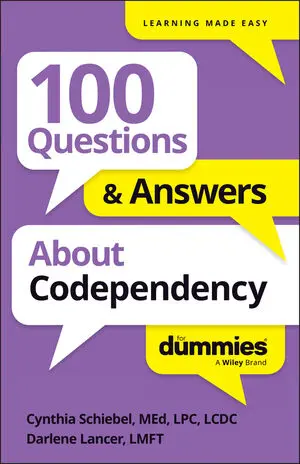This builtin is not currently supported: Animation
- Book & Article Categories

- Collections

- Custom Solutions
 Main Menu
Main MenuBook & Article Categories
 Main Menu
Main MenuBook & Article Categories
Darlene Lancer
Darlene Lancer, JD, LMFT, is a licensed marriage and family therapist and an expert and author on relationships and codependency. She has counseled individuals and couples for more than 30 years and coaches internationally. She is the co-author of 100 Questions & Answers About Codependency For Dummies.
Articles & Books From Darlene Lancer
Everything You Want to Know About Codependency: A Q&A Guide If you believe you may be in a codependent relationship or want to better recognize codependent patterns, 100 Questions & Answers About Codependency For Dummies is your go-to resource. This user-friendly guide helps you uncover the unhealthy pathways to codependency and teaches you how to break free from the cycle.
Article / Updated 10-20-2023
The best advice in healing from codependency would be “love yourself.” Does that sound kind of cheesy? Probably. It might even feel wrong because you’re so used to loving other people. Or you may not even know how to love you.But think about those you love. You want to know them, support them, encourage them, give to them, and make them happy.
Article / Updated 10-20-2023
Maybe you’re wondering whether you’re codependent. It may be hard to tell at first, because, unless you’re already in recovery, denial is a symptom of codependency. Whether or not you identify as codependent, you can still benefit from alleviating any symptoms you recognize. You will function better in your life.
Article / Updated 10-20-2023
Guilt can, in some instances, actually lead to self-improvement and build self-esteem. The problem for codependents is that their guilt is usually irrational and stems from shame and poor boundaries.Studies show that healthy guilt encourages people to have more empathy for others, to take corrective action, and to improve themselves.
Article / Updated 10-20-2023
Good parenting requires having appropriate and flexible boundaries that respect individuality and separateness. In healthy families, parents respect emotional, mental, sexual, and physical boundaries. In dysfunctional families, boundaries are rigid, blurred, or a mixture.
Individual boundaries
When boundaries are too rigid, family members are likely disengaged emotionally and physically.
Cheat Sheet / Updated 10-18-2023
If you wonder whether you may be codependent, you’re not alone. Different types of people may behave in a codependent manner, and codependence manifests in varying degrees of severity. Not all codependents are unhappy, but others live in pain or quiet desperation.Codependency is not something you heal from and are forever done with, but you can enjoy yourself, your life, and your relationships.
Article / Updated 10-18-2023
Codependents’ shame and low self-esteem result in problems with boundaries and dysfunctional communication. Self-esteem, clear boundaries, and the ability to be assertive are essential to healthy communication. They are the foundation for avoiding fights and handling conflict.Unresolved or escalating conflicts are the norm among codependent couples, who probably didn’t have good role models for expressing anger and handling conflict.
Article / Updated 10-18-2023
If you think you may be codependent, you need help to change your behavior. Here are some sources of help for those suffering from codependency:
Read all you can about codependency (but reading alone is insufficient to change).
Go to a Twelve Step meeting for codependents, such as Codependents Anonymous, called CoDA, or Al-Anon for family members of alcoholics.
Article / Updated 10-18-2023
Although mental health clinicians recognize codependency when they see it, the definition of codependency and who has it has been debated for decades. Experts agree that codependent patterns are passed on from one generation to another and that they can be unlearned — with help.
An overview
Therapists and counselors see people with an array of symptoms, such as depression, anxiety, addiction, or intimacy and relationships issues.
Article / Updated 03-07-2022
Although men can and do fall victim to codependency, women comprise the majority of codependents. There are many reasons in many categories: biological, developmental, political, cultural, religion, and societal.
Biological: While both women and men are biologically wired for relationships, under stress, men tend to prepare for action, while women’s hormones prepare them to make sure their relationships are healthy and intact.




